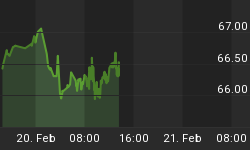The inflation market offers such wonderful opportunities for profit since so few people understand the dynamics of inflation, much less of the inflation market.
One of the things which continually fascinates me is how the inflation trade has become sort of a "risk on" kind of trade, in that when the market is pricing in better growth expectations, reflected in rising equity prices, inflation expectations move with the same rhythm.[1] The chart below (source: Bloomberg) shows the 10-year inflation breakeven rate versus the S&P 500 index. Note how closely they ebb and flow together, at least until the latest swoon in inflation expectations.

Your knee-jerk reaction might be that this is a spurious correlation caused by the fact that (a) bond yields tend to rise when growth expectations rise and (b) when bond yields rise, the components of bond yields - including both real rates and expected inflation - tend to rise. But look at the chart below (source: Bloomberg), covering the same period but this time charting stocks versus real yields.

If anything, real yields ought to be more correlated to movements in equities than inflation expectations, since presumably real economic growth is directly related to the real growth rates embedded in equity prices. But to my eyes at least, the correlation between real interest rates and equity prices, for which there is a plausible causal explanation, doesn't look nearly as good as the relationship between stocks and inflation expectations.
It doesn't make any sense that long-term inflation expectations should be so closely related to equity prices. I know I have mentioned before - in fact, regular readers are probably sick of me pointing it out - that there is no causal relationship between growth and inflation. Really, it is worse than that: one really needs to torture the data to find any connection at all, causal or not. The chart below (source: Bloomberg) shows quarterly real GDP in yellow against core inflation in white.

I've pointed out before that the big recession in '08-09 saw almost no deceleration in core inflation (and none at all if you remove housing from core inflation), but it's hard to find a connection anywhere. The next chart (source: Bloomberg) makes the point a different way, simply plotting core inflation (y-axis) against real GDP (x-axis) quarterly back to 1980.

In case anyone out there is protesting that there should be a lagged relationship between growth and inflation, I am happy to report that I was able to get an r-squared as higher as 0.257 with a lag of 12 quarters. Unfortunately, the lag goes the wrong way: high inflation precedes high growth, not vice-versa. And I don't know anyone who proffers a reasonable explanation of a causality running in that direction. Lags the other way fail to produce any r-squared over 0.1.
So, how to explain the fact that since the end of August we have seen 10-year real rates rise 29 basis points while 10-year breakevens were falling 12bps (producing a net rise in nominal rates of only 17bps)? The explanation is simple: the market is wrong to treat breakevens as a "risk on/risk off" sort of trade. Breakevens have cheapened far too much. I don't know if that means that TIPS yields have risen too much, or nominal yields have risen too little (I rather expect the former), but the difference is too narrow. The short end of the US curve (1 year inflation swaps are at 1.44%) implies either that core inflation will decline markedly from its already-depressed level well below median inflation, or that energy prices will decline sharply and much further than implied by gasoline futures.
I think that one of the reasons US inflation has been under pressure is that it is currently at a very large spread versus European inflation, and earlier this month it was at the highest level in at least a decade (see chart, source Enduring Investments).

This may look like an appealing short, perhaps, but based on our internal analysis and some historical relationships we track we actually believe the spread is too low by about 50bps. And think about it this way: if Europe really is in the process of inheriting Japan's lost decade, then 10-year expectations for the US ought to be much, much higher than in Europe. I don't really think Europe will end up there, because the ECB seems to be trying to do the right thing, but it is not unreasonable to think that there should be a hefty premium to US inflation over Europe.
[1] Of course, the correlation of levels won't be very good because stocks have an upward bias over time while inflation expectations do not. To run the correlation, you'd have to de-trend stocks but I'm trying to make a visceral point here rather than a quantitative one.
You can follow me @inflation_guy!
Enduring Investments is a registered investment adviser that specializes in solving inflation-related problems. Fill out the contact form at http://www.EnduringInvestments.com/contact and we will send you our latest Quarterly Inflation Outlook. And if you make sure to put your physical mailing address in the "comment" section of the contact form, we will also send you a copy of Michael Ashton's book "Maestro, My Ass!"
















